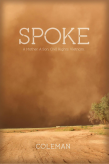An Oklahoma housewife finds herself unjustly imprisoned for her stance towards civil rights, testing her bond with her son who begins to find his own voice of opposition to the Vietnam War.
When Coleman's mother participated in civil rights demonstrations and sit-ins to end segregation, and then attempted to sell her home in an all white suburb of Oklahoma City to a black doctor, the city fathers had her declared insane. She lost her home, her children and everything she owned.
Five years later, Coleman followed his mother's example, and committed his own acts of civil disobedience against the draft and the Vietnam War. Serendipitously, it was his own act of resistance that led to his mother's liberation.
Coleman's experiences, and those of his mother, provide a lens through which to view one of the most tumultuous decades of the twentieth century. Drawing on his memory, his mother’s written reflections, interviews with contemporaries, and newly available documents, SPOKE recalls a recent time in America’s history when sacrifices were required, and sacrifices were made.
When Coleman's mother participated in civil rights demonstrations and sit-ins to end segregation, and then attempted to sell her home in an all white suburb of Oklahoma City to a black doctor, the city fathers had her declared insane. She lost her home, her children and everything she owned.
Five years later, Coleman followed his mother's example, and committed his own acts of civil disobedience against the draft and the Vietnam War. Serendipitously, it was his own act of resistance that led to his mother's liberation.
Coleman's experiences, and those of his mother, provide a lens through which to view one of the most tumultuous decades of the twentieth century. Drawing on his memory, his mother’s written reflections, interviews with contemporaries, and newly available documents, SPOKE recalls a recent time in America’s history when sacrifices were required, and sacrifices were made.
"SPOKE is a true story. It is written from my memories, from material in my substantial personal collection of letters and papers, from 900 pages of FBI files secured under the FOIA, from my mother's hospital records, from interviews and newspaper files, from court records, and from documents provided by the Oklahoma Historical Society and the Daniel and Phillip Berrigan Collection in the Cornell University Rare Books Library."
